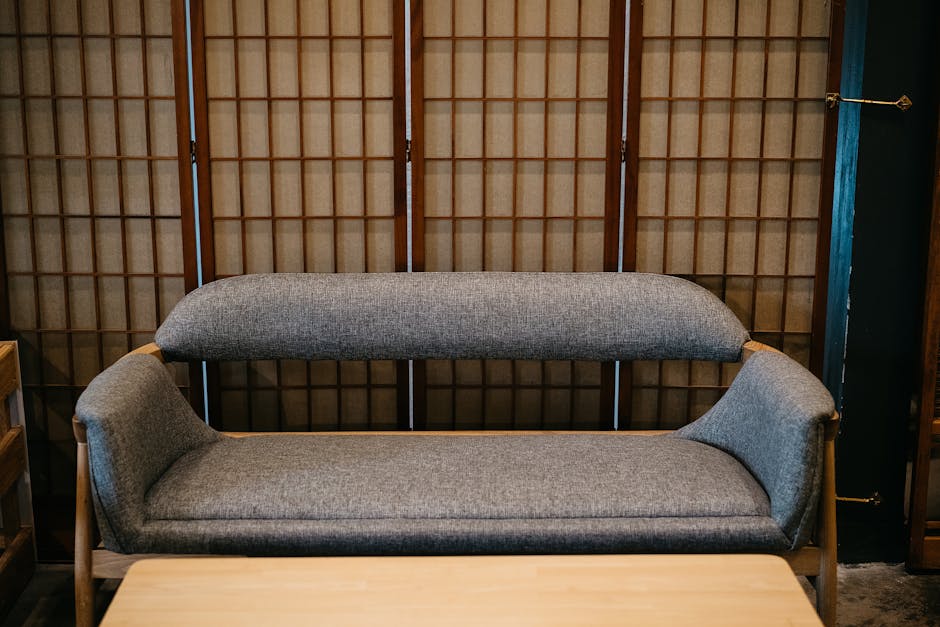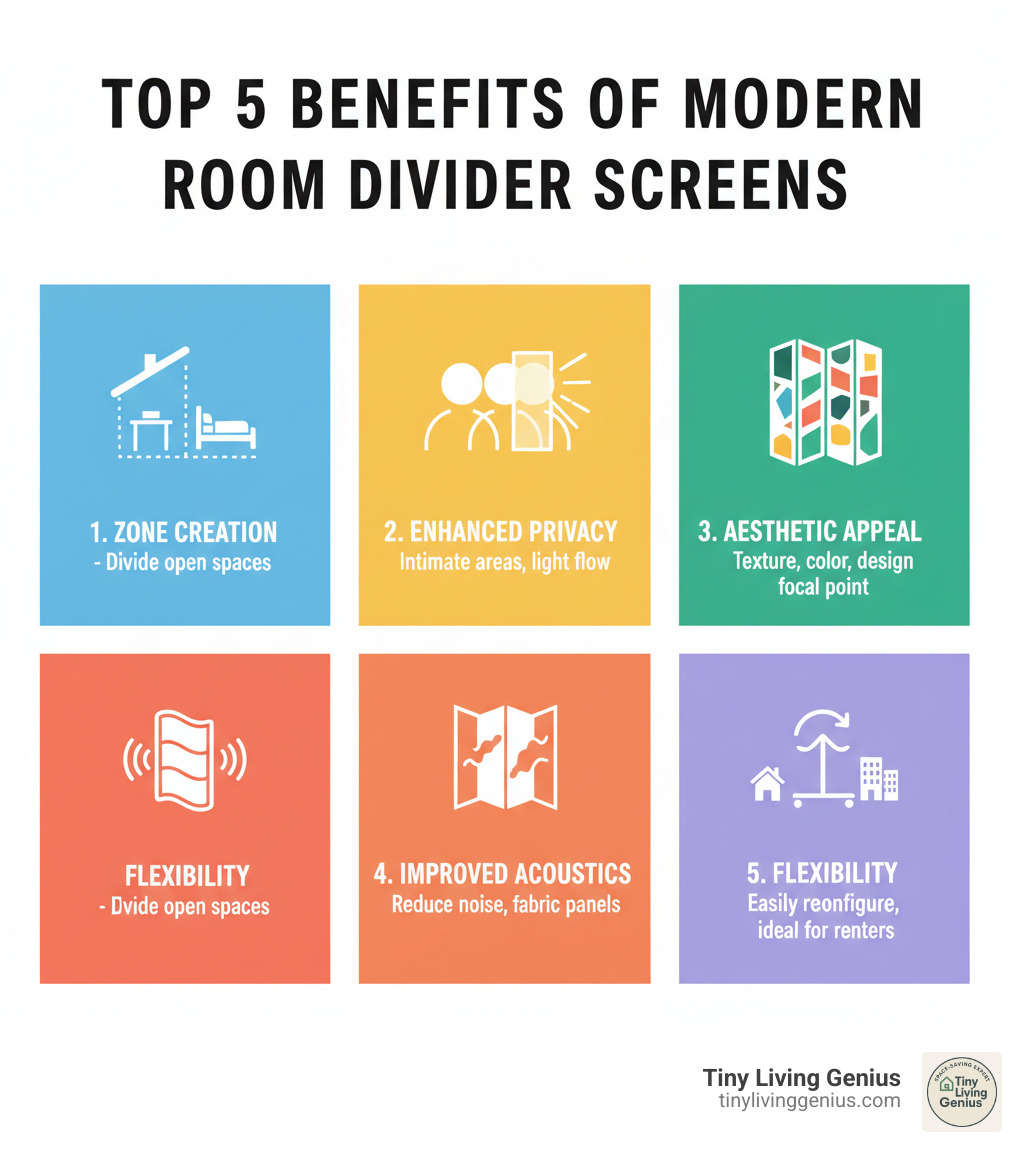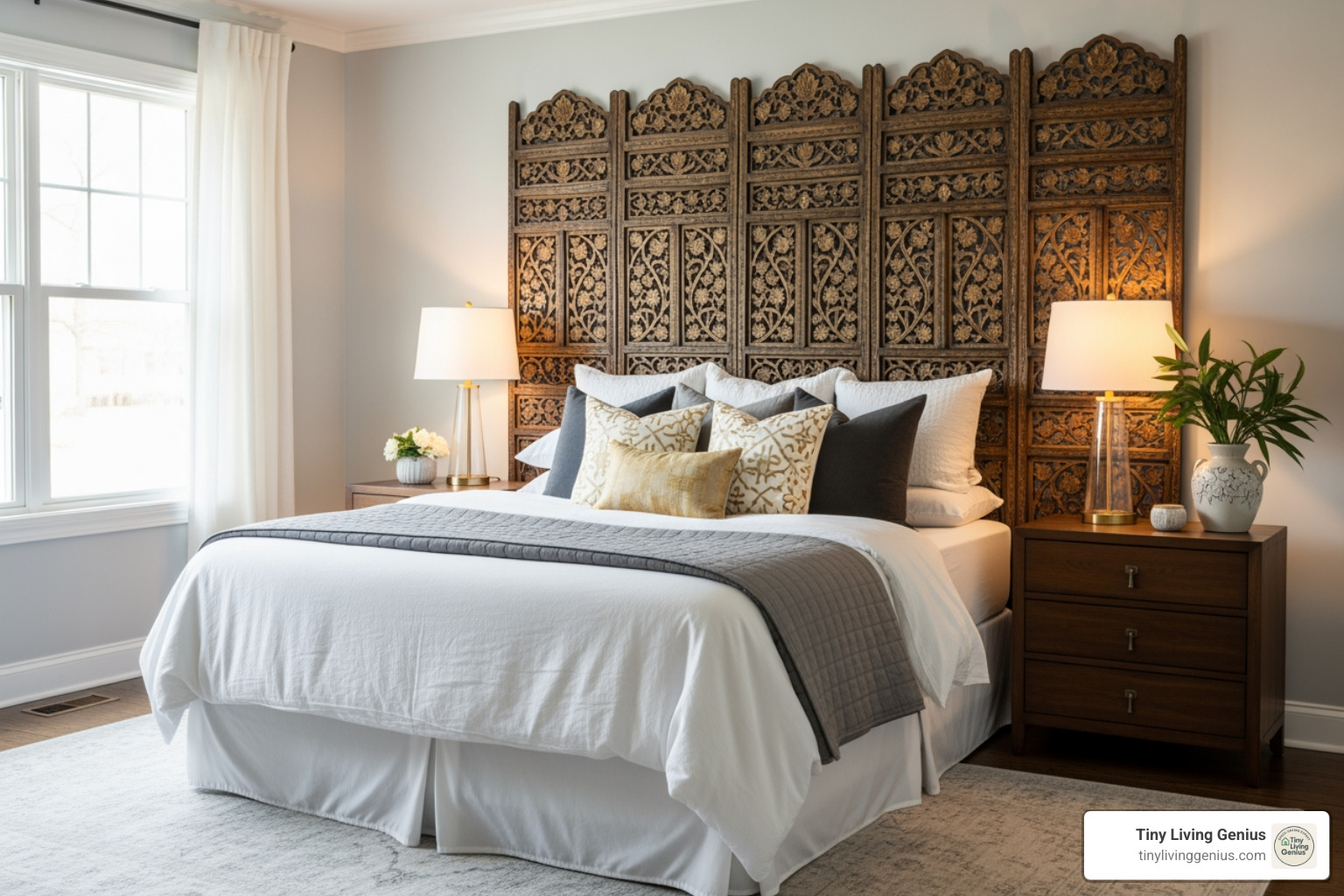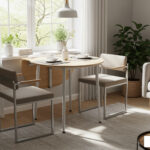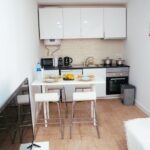Modern room divider screen: Top 5 Transformative Ideas
Why Modern Room Divider Screens Are Essential for Small-Space Living
A modern room divider screen is a freestanding or fixed partition that separates spaces without building permanent walls. These versatile pieces come in various styles—from folding screens and wood slat panels to shelving units—and serve dual purposes: creating functional zones while adding visual interest.
Quick Answer: What You Need to Know
- Function: Divides open spaces into distinct zones (bedroom, office, dining).
- Privacy: Creates intimate areas without blocking light or airflow.
- Styles: Folding screens, hanging panels, slat walls, bookcase dividers.
- Materials: Wood, metal, glass, and fabric.
- Best For: Studio apartments, open-plan layouts, and home offices.
Open-concept living is common, but it presents challenges: how do you create a bedroom that feels separate from your workspace? Or hide clutter when guests arrive? That’s where room dividers come in. The market for these dividers is growing, reflecting a real need for flexible solutions that maximize space without permanent construction.
A well-chosen divider doesn’t just separate—it transforms. It can turn a corner into a home office, create a cozy reading nook, or serve as a stunning focal point. From mid-century modern wood slats to minimalist metal frames, today’s dividers blend function with style.
As the founder of Tiny Living Genius, I’ve seen how the right modern room divider screen can completely reimagine a cramped apartment. Let’s explore how these functional art pieces can work for you.
Modern room divider screen terms to learn:
- bookshelf divider ideas
- partition rack design
- tv rack partition design
The Functional Art Piece: Why Every Modern Home Needs a Room Divider
A modern room divider screen is more than just a partition; it’s a transformative piece of functional art. It carves out distinct zones, adds privacy, and can even dampen sound, all while serving as a stunning focal point. In an era where flexibility is key, these dividers offer a way to reimagine your home without permanent changes.
For more strategies on compact living, check out our Tiny Apartment Design: The Ultimate Guide to Smart Solutions for Tiny Living.
Defining Spaces Without Walls
Open-plan layouts are popular, but they often lack definition. A modern room divider screen creates visual separation without boxing you in, helping to distinguish a dining area from a living room or create a makeshift entryway. A strategically placed folding screen or shelving unit can define zones while maintaining the airy, open flow that makes small spaces feel larger.
Adding Privacy and Focus
We all need pockets of privacy, especially in small or shared homes. A divider can create an intimate home office nook, a secluded dressing area, or a sanctuary-like bedroom space. By reducing visual distractions, a simple screen helps you focus on work or relax more easily. The psychological impact is significant; a physical boundary helps your brain register a shift in purpose from one zone to another.
For more ideas on separating living and sleeping areas, explore our guide on studio layouts.
Elevating Your Interior Design
A room divider is a design statement. A geometric wood divider adds architectural interest, a carved screen acts as sculpture, and an upholstered panel introduces texture and warmth. Whether you want a pop of color or a subtle piece that adds dimension, a divider can become the focal point that ties your room together. Many modern designs draw from mid-century aesthetics, blending clean lines and natural materials to create functional beauty.
A Style for Every Space: Types of Modern Dividers
From the timeless elegance of a folding screen to the clever dual-purpose design of a bookcase, there’s a modern room divider screen for every space and style. Let’s explore the main types to find the best fit for your home.
Here are some popular modern room divider styles:
- Folding Screens: Portable and versatile, often with multiple panels.
- Hanging and Panel Dividers: Fixed or suspended for a more permanent feel.
- Shelving and Bookcase Dividers: Dual-purpose, providing storage and separation.
- Fixed Slat and Fin Walls: Architectural elements that offer partial privacy.
Folding Screens
For maximum flexibility, folding screens are hard to beat. They are practical, portable, and renter-friendly, requiring no installation. The variety is impressive, from traditional Japanese Shoji screens that gently filter light to carved wood panels that add texture. When not in use, they fold away for easy storage.
Hanging and Panel Dividers
For a more integrated look, hanging and panel dividers make a statement while keeping the space airy. Ceiling-mounted dividers create a “floating” effect that defines zones without touching the floor, while fixed panels offer more substantial separation. Designs range from laser-cut patterns to translucent materials like frosted glass, which are ideal for maintaining brightness in lofts and studios.
For more creative approaches, check out our Room divider inspiration and ideas.
Shelving and Bookcase Dividers
Why settle for a divider that only divides? Shelving units are champions in small spaces, offering separation and storage simultaneously. An open bookcase or cube shelving unit can be accessed from both sides, creating display space while defining two distinct areas. They are perfect for separating a home office from a living room or creating a dining nook.
Learn more about this approach with our guide on More on partition racks.
Fixed Slat and Fin Walls
Inspired by mid-century modern design, slat and fin walls add architectural interest with clean, vertical lines. Wood slats bring warmth and natural texture, while metal fins offer a sleeker, industrial vibe. They provide partial privacy while allowing light and air to flow freely, drawing the eye upward to make ceilings feel higher.
Material Matters: Choosing the Right Fabric for Function and Flair
The material of your modern room divider screen shapes its look, durability, and function. Wood brings warmth, metal and glass offer a sleek look, and fabric provides softness and acoustic benefits. Choosing the right one depends on your space and lifestyle.
| Material | Pros (Aesthetics, Durability) | Cons (Cost, Maintenance) | Best For (Privacy, Light) |
|---|---|---|---|
| Wood | Warmth, natural beauty, sturdy, timeless | Can be heavy, requires dusting/polishing | Partial to full privacy, natural light filtering |
| Metal | Industrial look, high durability, sleek | Can be costly, potentially cold aesthetic | Partial privacy, minimal light obstruction |
| Glass | Maximizes light, modern, neat | Fragile, can be expensive, fingerprints | Visual separation, high light transmission |
| Fabric | Softness, color/texture options, acoustic properties, lightweight | Less durable, can stain, requires cleaning | Full privacy, adjustable light blocking |
The Warmth of Wood
Wood brings an organic warmth that’s hard to beat, with options like walnut, oak, rattan, and bamboo. Wood slat dividers are especially popular, offering a balance of openness and privacy that fits well with classic midcentury themes. While wood requires some care, its timeless appeal makes it a top choice for a cozy, inviting aesthetic. For more ideas, Explore midcentury modern inspiration.
The Sleekness of Metal and Glass
For a contemporary, open, and industrial feel, metal and glass are excellent choices. A sleek steel frame with frosted or fluted glass panels creates sophisticated boundaries without blocking light, making it ideal for small apartments. Frosted glass offers privacy, while fluted glass adds texture. These materials are durable and low-maintenance, though they can be pricier and may require professional installation.
Find more ways to maximize your space with our Smart storage ideas.
The Softness of Fabric and Upholstery
Fabric and upholstered panels bring softness, color, and texture to a space. They also help absorb sound, making your home quieter. Curtains and drapes are a flexible and affordable option, while upholstered panels offer a more substantial barrier with excellent acoustic properties for bedrooms or home offices. Fabric requires more maintenance but is transformative for creating a cozy, sound-dampened environment.
Beyond the Basics: Creative Ways to Use Your Room Divider
A modern room divider screen can do more than just partition a room. Think of it as a versatile decor piece with surprising uses.
As a Statement Headboard
Use an oversized folding screen as a dramatic headboard. A carved wooden screen or a rich velvet panel can transform your bed into a focal point, creating a cozy, enclosed feeling without the bulk of a traditional headboard.
As a Vertical Garden
Turn your divider into a living wall. Use a trellis-style screen to support climbing plants like pothos, or hang planters from a standing divider. This biophilic approach adds natural beauty, improves air quality, and creates a calming atmosphere.
As a Makeshift Entryway
If your front door opens directly into your living space, use a divider to create a proper foyer. Position a screen near the entrance to define an entryway, add a slim console table for keys, and instantly make your home feel more organized and welcoming.
As an Artistic Backdrop
A decorative room divider makes an excellent backdrop for video calls, hiding clutter and adding personality. It can also serve as a flexible gallery wall for displaying photos or art. Your divider becomes a beautiful and practical way to conceal less-than-perfect views.
If you’re feeling crafty, explore DIY room divider projects for personalized creations.
The Practical Guide: Selecting and Placing Your Modern Room Divider Screen
Choosing the right modern room divider screen involves practical considerations like size, installation, and placement. Here’s how to select the perfect divider for your home.
Sizing, Installation, and Maintenance
First, measure your space (height, width, and depth) to ensure a proper fit. Decide between freestanding options like folding screens, which are flexible and renter-friendly, or fixed panels that offer a more permanent, integrated look but may require installation. Maintenance depends on the material: wood needs dusting, fabric may need spot-cleaning, and glass or metal can be wiped down.
For the Living Room
A divider can organize an open-plan living room by separating seating and dining areas, creating a cozy reading nook, or hiding electronics. Slatted wood or partial glass dividers define zones while keeping the space feeling airy. For flexibility, a movable folding screen can help manage traffic flow during gatherings.
For the Bedroom
In the bedroom, a divider can create privacy for dressing, separate a sleep area from a workspace, or form a small seating area. Fabric or upholstered panels are ideal here, as they add softness and absorb sound, enhancing the room’s sanctuary feel. In a studio, a divider is essential for creating the illusion of a separate bedroom.
For more ways to maximize your compact bedroom, check out our Ideas for tiny flats.
For the Home Office
A modern room divider screen can transform a corner into a proper home office. The goal is to define a workspace that feels separate, helping you focus. Bookshelf dividers are a smart choice, offering both visual separation and storage. To minimize distractions, choose a solid or slatted panel. For better acoustics on video calls, consider a fabric screen.
Frequently Asked Questions about Modern Room Dividers
How do I choose a room divider that doesn’t block natural light?
To maintain natural light, choose dividers with slats, perforations, or translucent materials like frosted glass, sheer fabric, or open shelving. These options provide visual separation without making a space feel dark. Adjustable slat dividers are also great for controlling light and privacy. For more insights, check out our Tips for natural light in small spaces.
Are room dividers a good solution for studio apartments?
Yes, room dividers are essential for studio apartments. They create distinct “rooms” for sleeping, living, and working within a single open space. This maximizes functionality and helps your studio feel larger and more organized without building permanent walls. To see this in action, look at our guide on See studio furniture layouts.
How do I clean and maintain my room divider?
Maintenance depends on the material of your modern room divider screen:
- Wood: Dust regularly. Clean with a damp cloth and mild wood cleaner, then dry. Polish occasionally.
- Metal: Wipe with a damp cloth and a mild all-purpose cleaner. Dry thoroughly to prevent spots.
- Glass: Use glass cleaner and a microfiber cloth for a streak-free shine.
- Fabric: Vacuum regularly with an upholstery attachment. Spot-clean spills immediately per the manufacturer’s instructions.
Always check the manufacturer’s care guide for specific instructions.
Conclusion
A modern room divider screen is more than just furniture; it’s a powerful tool for creating the home you need. As we’ve explored, these versatile pieces define zones, create privacy, and add beauty, all without permanent walls. Whether you choose the warmth of wood, the sleekness of glass, or the softness of fabric, there is a divider to fit your style.
From serving as a statement headboard to organizing your life as a bookcase, dividers prove that smart design doesn’t require a big budget. Their flexibility makes them perfect for renters and anyone who values adaptable living. A modern room divider screen is a key piece in making a small space feel both functional and stylish.
At Tiny Living Genius, we’re passionate about helping you make the most of every inch. A room divider is often the piece that brings everything together. Ready to transform your home? Explore more space-saving furniture solutions and find how thoughtful design can redefine how you live.

